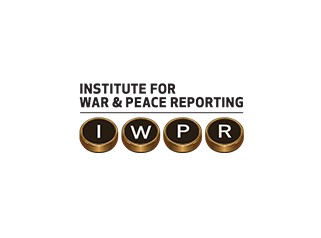Anthony Borden, Executive Director of IWPR
Interviewed by Robert Sher
Company Name: Institute for War and Peace Reporting (IWPR)
Website: https://www.iwpr.net/
Founded: 1992
Headquarters: London, England
Interview Date: February 28, 2022
Why did you go into this line of work?
My mother was a journalist, so I was raised with writing and reporting as high values. I worked as a reporter and editor in New York City before relocating to London. We were created in the first Gulf war over Kuwait as a volunteer action. As that project wound down, I picked it up and established IWPR. I felt there were alternative concepts of journalism that could contribute to better societies, and we needed an institutional base to drive that vision. It has been a major challenge to evolve into a chief executive over the years. But I remain in the end a journalist.
Personally going to a war zone seems outside your normal leadership duties. Why did you decide to do it?
This is an epochal conflict, shaking the foundations of the world we know. Our fundamental values of freedom and democracy are on the line. As a journalist, the opportunity of witness is unmissable. It is also a “white heat” opportunity to try to break moulds, work differently, kick the entire operation (including myself) into a higher gear, and see how we respond. If not now, when?
I have often travelled to conflict regions, Sarajevo, Baghdad, Kabul. But few-day oversight or cultivation visits are not the same as really diving more deeply into a country and our work there. Equally, there is a competitive element – given our name, I felt we had to respond profoundly or else face the question of what is our purpose.
How is your going in person to Ukraine at this time perceived by your team?
They are concerned of course for my personal safety but know that I will take all necessary precautions. We lost a key man some years ago in Iraq, but have worked hard to learn lessons and put in place capacity and systems to improve security. The teams have supported me unbelievably and worked around the clock to get reports out, make connections, assist with both logistics and contacts, and produce editorial. I hope these efforts make all staff inspired to feel the vital importance of our work. “What do you think, there’s a war on?” Well, there is, and everyone is responding incredibly.
What was your intent in going? What were your objectives? As a leader and as a person?
We have four staff in Ukraine, and I felt it impossible not to be with them. Given the epochal stakes, I also wanted to make sure that IWPR does everything we possibly can to challenge Putin’s propaganda, and this could only happen if I was there. We work with a wide network of local media and civic groups – some of whom played key roles in the Maidan Revolution which overthrew Putin’s puppet. I know from Sarajevo days that connections made at such times are very powerful. As a journalist.
Support for IWPR’s team at a time when they were on the brink of war and also to connect with the journalistic community who have shown great courage when faced with the hostility towards the media since their demonisation and accusations of “fake news”.
You lead a midsized organization. If you had been a small business would you/could you have done this? Do large organizations such as you do this?
I founded IWPR without taking salary, and from nothing we built up a credible local reporting network during those conflicts that rolled off and continues to this day. But I often reflect that I could have spent more time in those years in Sarajevo, Belgrade and Pristina. So maybe this is in part putting that right.
Given our existing programmatic commitments, we could not have done this now if we were not in a reasonably good position, financially and structurally. A great deal of effort over the past several years has built a senior team, led by a superb COO, so that I can exempt myself from most day to day. Indeed, without me I think they’ve raised to the challenge and are working even better!
I’d guess few large organizations would send their chief executive where even embassies have pulled out. Having said that, there are superb charity heads especially in the humanitarian sector who lead from the front, and I’ve not always spent as much time in the field as I would like. Family is also a big consideration.
Please give some insight into how you are messaging what you are doing inside and outside the org.
Charities need resources to achieve their mission, and this is literally a DEFCOM 1 scale crisis. It certainly underlines the importance of our work. So, we are writing to our supporters to engage them on how they may help, and to dialogue over urgent response, particularly flak jackets, humanitarian response and crisis reporting. In the medium term, we will look to grow our support as the current work is pointing to new work and even potential major departures. One of those is to increase external communications.
How big is your paid staff, and how big is your unpaid/volunteer/reporters you are supporting?
We have a total of 199 paid staff and 2 interns, 9 offices.
What is your “normal” role as the top leader? Normal functions.
Lead the strategic direction of IWPR, cultivation and outreach. Account to the governance committees of our three divisions – US, UK and the Netherlands – and build and engage the International Board. Motivate staff, and troubleshoot as needed. (COO runs day to day.) Oversee editorial products of IWPR.
